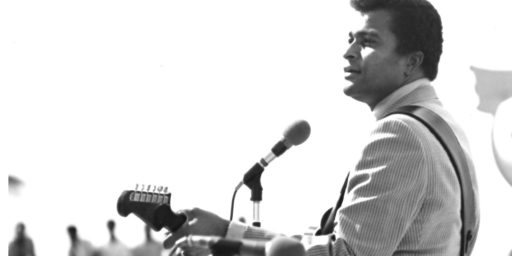Senate Organization and the 2000 Precedent
Jonathan Singer argues that Senate Democrats should fight off any attempts by Republicans to rely on the Daschle-Lott precedent of 2000 agreeing to a change in leadership should the other side gain a majority during the next two years. His argument is that, in 2000, there was a Democratic vice president (Al Gore) at the time of organization who could have broken the electorate-generated 50-50 tie in the Senate and technically made Daschle Majority Leader and allowed Democrats to appoint committee chairs. This time, the electorate gave the Democrats a pure majority.
I agree that circumstances are different here, although the fact that a vice president just defeated for elevation to the presidency and a few days from being out of office altogether strikes me as a rather lame justification. That the Democrats now have a majority whereas the Republicans had a tie then, though, is a fair point.
On the other hand, the bizarre circumstances of 1954 notwithstanding, there’s no way either party nowadays would stand for being relegated to minority status if it had the numbers to govern. As Singer notes, regardless of what the organizing resolution said, the Democrats would have shut down the Senate had their ill-gotten “majority” of 2001 not been recognized. Similarly, the Republicans would not abide a Majority Leader Reid if replacement or defection gave them a working majority.
Regardless, I take Trent Lott at his word when he says, “My expectation and hope is that Tim [Johnson] will recover fully and come back and we’ll go to work. You know, I’d like to be in the majority, but I don’t want to do it that way.” Ditto a Joe Lieberman defection.






I gotta admit, that’s some of the classiest stuff I’ve ever seen come out of Lott…
First, I hope this all becomes moot since he gets a full recovery. But should he not able to return to work, I am not getting the “fair” argument.
By the “fair” resoning, if the Pres and VP died, then Pelosi shouldn’t take office since her party wasn’t the one elected to the top office. See that happening?
The system isn’t perfect, but government is set up for stability, not to make sure a ruling party keeps its majority should something go wrong.
Any technicality will do to limit the power of the democrats. That is until they come to their senses and drop their vendetta against America.Tim Johnson,however, doesn’t need to completely recover to serve as a functioning democrat. He only needs to be able to say AYE! on command, like the rest of them. I hear they plan to nominate Hillary[alias Anne cephalic] for president, after all.
I have two points of contention with this article. First, the electorate did NOT give the Democrats a “pure majority”, they hold only 49 seats, one more than the Republicans. And any change of affiliation by Joe Lieberman to either party would be hard to classify as a defection since his independent status means he doesn’t belong to a party from which he could defect.
Patrick:
Technically true, especially since Lieberman lost the Democratic primary. Still, he ran promising that he would caucus with the Dems. And Sanders is a socialist. Surely, he’s got more in common with the D’s than the R’s.
Let’s just do a wait and see.
It is possible that the senator will make a full recovery, and this whole “it’s not fair” argument will be moot. I think declaring the man unfit or all but dead at this point is too early and feels a bit like vultures gathering.
That said, I don’t buy the whole “the electorate gave the democrats a majority” argument.
The electorate in certain states chose the democratic senate candidate over the GOP one, but that isn’t the electorate of the nation.
The people of South Dakota didn’t have a senator running this election cycle. They had no say with regard to their will over who controls the senate.
Senate control isn’t a national race, it is a state by state race, and not all states got a say this go around.
just me:
You’re certainly right in saying “Senate control isn’t a national race, it is a state by state race, and not all states got a say this go around.” Still, Democratic control is the will of the electorates of the several states expressed individually over a period of six years. It’s a rather odd process in that regard but it’s the process put in place by the Framers.